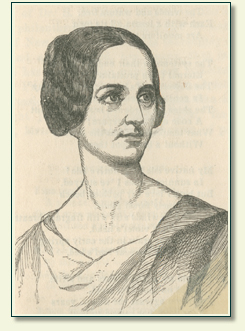|
|
|
|
|
|
|
After her father, a farmer, died when Mary Hewitt was
three years old, she and her mother moved from the family's home in Best known for the publication of her poetry in various periodicals, Mary Hewitt edited the 1850 gift-book The Gem of the Western World and edited a memorial of Frances S. Osgood shortly after her fellow-poetess's death in 1851. Her published volumes of poetry include Songs of our Land (1845) and Poems, Sacred, Passionate, and Legendary (1864). Edgar Allan Poe's appraisal of her work offers both praise and criticism, noting that her "compositions evince poetic fervor, classicism, and keen appreciation of both moral and physical beauty. No one of them, perhaps, can be judiciously commended as a whole; but no one of them is without merit." In 1846, Edgar Allan Poe described her in his “The Literati of New York City. No. VI,” in Godey’s Lady’s Book, v. 33, p. 159: In
character she is sincere, fervent, benevolent, with a heart full of the
truest charity— sensitive to praise and to blame; in temperament,
melancholy (although this is not precisely the term); in manner, subdued,
gentle, yet with grace and dignity; converses impressively, earnestly, yet
quietly and in a low tone. In person she is tall and slender, with black hair
and large gray eyes; complexion also dark; the general expression of the
countenance singularly interesting and agreeable. |
|
|
|


